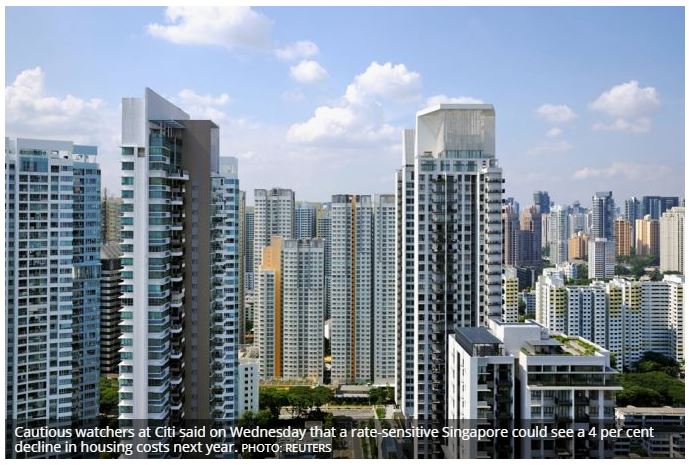Housing demand could still fuel 2019 growth in Singapore
THE local housing market could still support Singapore’s growth in 2019, despite the curbs unveiled this year, bank analysts said this week.
Standard Chartered’s (StanChart) global chief economist David Mann, who is based here, acknowledged that “there are lots of cross-currents” in the air, from dampeners like an electronics cycle slowdown to upsides like a ramp-up in investment diversions into Asean.
His bank’s recently released outlook assumes a base-case slowdown, with a trade war between the United States and China deemed “a key downside risk, given the small and open nature of Singapore’s economy”.
But the crystal ball still calls “for the domestic part of the economy to help to counter any slower story from the external parts”, Mr Mann told The Business Times on Thursday morning.
Domestic drivers could include “a relatively robust market demand for housing” that supports home prices as inflation grows, he said, while lauding shock cooling measures as a cap on “unnecessary speculative froth”.
Cautious watchers at Citi, while noting that a correction in housing markets would likely not have a material impact on financial stability, credit conditions or growth, still said on Wednesday that a rate-sensitive Singapore could see a 4 per cent decline in housing costs next year.
Other factors that Citi cited were July’s market-cooling measures, and soft Housing Board resale prices.
Yet Mr Mann said that fears of a hit from rate hikes could be overblown, given conservative macroprudential policy, such as loan limits, which “has provided buffer from risk”.
With a dovish outlook on Fed rates and a cheerier view of China growth, StanChart has bucked industry’s global predictions for next year.
It pegged China’s growth at 6.4 per cent, or 0.2 point ahead of consensus, and foresees quarterly 0.25-point rate increases from the US Fed.
Where Singapore is concerned, though, the house hews to the street’s view: It expects economic growth to cool to 2.6 per cent in 2019, from an estimated 3.3 per cent this year.
But a more bullish ANZ, pinning its hopes on a pick-up in residential property investment, said in a report on Thursday that Singapore could see gross domestic product (GDP) growth of as much as 3 per cent in 2019 – not too far off from this year’s projection.
The manpower outlook has kept watchers’ hopes up as well, especially as a supportive factor for inflation.
“Singapore’s labour market has been improving, which will lead to decent wage growth next year and in turn result in higher inflationary pressure, particularly in the services sector,” the ANZ research team wrote.
Headline inflation, which includes housing and transport costs, is widely expected to at least double from 2018’s estimate of 0.5 per cent.
As for the squeeze that the US-China trade war is putting on global growth, economists tended to be guardedly optimistic on trade and investment flows shifting to Asean.
ANZ said in its report that Singapore’s slowing export growth “appears to be more from a high base and a moderation in the tech cycle” than fuelled by the trade conflict, while Citi’s Kit Wei Zheng (see amendment note) and Ang Kai Wei wrote that “the cushion to Singapore’s GDP could be significant” if exports of goods and services to Asean rise on the back of trade diversion and supply chain reconfiguration.
Mr Mann told BT that regional markets like Vietnam may benefit more from these diversions, as Singapore “is not as much of a direct competitor to China in terms of selling goods to the US”, but agreed that the Republic could still reap gains from its indirect role in regional value chains.
Meanwhile, StanChart also noted that foreign direct investment (FDI) into China has fallen in tandem with Asean’s rise, while the Middle Kingdom beefed up its FDI into South-east Asia in 2016 and 2017.
Fallout from the US-China trade war could just be pushing investors into Asean sooner and faster than had been predicted, Mr Mann said.
He identified the main investment sources as East Asian – that is, mainland China, Taiwan, Japan and South Korea – with some contribution from global multinationals; but “we’re not looking at a sudden burst of investment growth in the next 12 months”.
Source: https://www.businesstimes.com.sg/government-economy/housing-demand-could-still-fuel-2019-growth-in-singapore


 Thailand
Thailand




